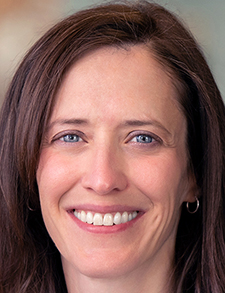
Dr. Franco
A project intending to help optimize how rounding is performed in hospitals won this year’s Research Shark Tank competition at SHM Converge in March, coming after a compelling set of presentations on ways to tackle some of hospitalists’ major challenges.
The winning proposal—from Thérèse Franco, MD, SFHM, associate regional medical director for Virginia Mason Franciscan Health in Seattle—was for a “dynamic rounding checklist,” in which information pertinent to rounding, including central line status, presence of a urinary catheter, and risk factors for pressure injuries, comes in an easier-to-use presentation. One feature is its “traffic signal format” with green for all is well, yellow for more information is needed, and red for a potential trouble spot.
Winning the competition means that the project coordinators will have four experts at their disposal for mentoring: Andrew Auerbach, MD, MPH, professor of medicine at the University of California, San Francisco; Luci Leykum, MD, MBA, MSc, affiliate professor at the University of Texas Dell Medical School in Austin, Texas; Hardeep Singh, MD, MPH, professor of medicine at the Center for Innovations in Quality, Effectiveness, and Safety at Baylor College of Medicine in Houston; and Thomas Barrett, MD, MCR, associate professor of hospital medicine at Oregon Health & Science University in Portland, Ore. The panel of these “sharks”—who asked tough questions of the presenters—offers experience in complex quality-improvement projects and entrepreneurship.
“I think the sharks can help me take what I have and really get it to the next level,” Dr. Franco said in an interview after the competition.
Two other proposals competed in the event. Sonia Dalal, MD, assistant professor of medicine at Johns Hopkins School of Medicine in Baltimore, proposed a project involving structured weekly teleconferences with nursing homes to help with the transition of patients from hospital to nursing care and reduce readmissions.
Jaimie Weber, MD, attending physician at Tampa General Hospital in Tampa, Fla., proposed a project to provide a system for early detection of sepsis and other patient deteriorations, intending to avoid unanticipated code-blues.
“They were all excellent and all (were) important areas,” Dr. Leykum said during the event. “This was really challenging for us. In part it came down to which group we thought was at a place where we could help the most in terms of input.” She said the other participants were welcome to contact the experts for advice as well.
Revamping the rounds checklist could help reduce hospital-acquired infections and pressure injuries, which are “common, costly, and deadly,” Dr. Franco said. One in 31 patients is affected by these injuries, she said, amounting to $28 billion in direct care, along with the pain and suffering to patients. Pressure injuries come with a 22.5% mortality rate, she said.
Dr. Franco’s project aims to give the rounding checklist increased visibility, to use it to provide more accurate documentation, and to provide more timely care and more effective collaboration.
For example, for the urinary catheter item in the checklist, if a patient doesn’t have one, the light is green. If yes, the number of days is displayed. If the reason for continuing the catheter has been documented within the past 24 hours, the light is yellow and the reason has to be added. If no reason has been documented within the past 24 hours, the light is red, and the clinician needs to “assess the necessity” of the catheter.
“It’s a visual cue that gives situational awareness to your whole team,” Dr. Franco said.
She described the revamped rounding checklist as a “shared virtual workspace” that acts as a “single source of truth.”
“The double documentation has to stop,” she said. “Everybody sees the same data and everybody responds accordingly. No more double documentation.”
The urge to improve the rounding process and reduce hospital-induced problems stems, in part, from her experience as a resident when one of her patients was lost to an infected pressure injury after a lengthy stay in the hospital.
“I feel passionate about what I call ‘hospital-itis’—problems or distress that the patients didn’t have when they came to us and we created,” she said. “It’s an all-encompassing syndrome, things like HAIs, hospital-acquired infections, hospital-acquired injuries. But it’s also things like, we lost their hearing aid. Problems that they didn’t have and happened in the hospital. We want to make people feel better. We can’t have these things.”
Dr. Franco said the mentorship will be a big help with the project.
“I do feel like the ideas that I have are large and I work in a large system, so it’s a big body of work that I would really like to move forward,” she said. “So, I’m really grateful for the opportunity and mentorship and the ability to grow as a professional.”
She confesses a bit of anxiety as she continues her work.
“Now I feel like I’d better deliver,” she said. “I’ve got to make the sharks proud.”
Tom Collins is a medical writer in Florida.